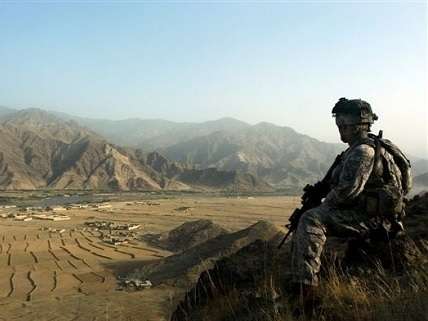Latest NDAA Prohibits Closure of Gitmo, Envisions Terrorism-Free Middle East, Expands Selective Service to Young Women
Also deals with base closures, domestic violence, and the Global Cultural Knowledge Network


The House is expected this week to vote on the National Defense Authorization Act of 2017 (H.R. 4909). At 1299 pages, the latest NDAA covers everything from a pilot program to modernize electromagnetic warfare (sec. 241) to new provisions on sexual assault and domestic abuse (sec. 541-6) to opening up selective service to females aged 18 to 26 (sec. 528).
The NDAA also continues the practice of prohibiting funding for the closure of the U.S. base at Guantanamo Bay or the transfer of detainees from there (secs. 1032-1035), as well as suspending the process for other base "realignments" and closures (sec. 2702), two of several provisions the White House has identified as problematic.
A memo from the White House Office of Management and Budget (OMB) warns that senior aides will recommend President Obama veto the NDAA if it arrives at his desk unchanged. The White House's primary objections are over authorized funding levels, which will be executed in a concomitant appropriations bill.
The House version of the NDAA reverses the Obama administration's decisions on items deemed to be "unfunded priorities," including an additional 27,000 active-duty troops, $3 billion for more Navy aircraft and more F-35 fighters, and $2 billion above what the Obama administration proposed for Navy shipbuilding, as Defense News reports. H.R. 4909 also moves $18 billion in wartime funds toward base budget programs in an effort to avoid budget caps.
The White House asserts under the NDAA certain wartime funding would expire at the end of next April, forcing the next president to ask for supplemental funding. The White House argues these portions of the NDAA are an attempt by House Republicans to undermine the previous agreement on funding increases under which the 2011 sequester was lifted.
The 1974 Budget Act requires Congress to approve a concurrent budget resolution by April 15 and to start work on appropriations bills on May 15 with a deadline for passage of June 30. "None of these deadlines are enforceable and they are regularly missed," the Committee for a Responsible Federal Budget notes. "The practical deadline for passage of appropriations is October 1, when the next fiscal year begins and the previous appropriation bills expire."
In addition to prohibiting action to close Gitmo, the NDAA also calls on the Defense Secretary to propose to Congress "a comprehensive strategy for the detention of current and future individuals captured and held pursuant to" the post-9/11 AUMF.
The NDAA also extends the authority of the Defense Department to assist organized armed forces in Iraq that are fighting ISIS (sec. 1222), and lest it not appear goal-oriented, Congress also demands in the NDAA that within six months of its passage the Defense Secretary will offer to Congress "a report that describes the political, economic, and security conditions in Iraq and Syria that would be necessary and sufficient to prevent the formation of future terrorist organizations in Iraq and Syria that may present a danger to the United States, its allies, and the stability of Iraq, Syria, and the rest of the Middle East region."
H.R. 4909 also extends logistical support for "coalition forces" by one year (sec. 1201), extends authority to conduct joint training with "friendly" foreign countires (sec. 1202), and extends the authority to "enhance the capability of foreign countries to respond to incidents involving weapons of mass destruction" (sec. 1203).
The NDAA also focuses on Russia, calling on the U.S. to "reassure" its partners and allies about, and deter, regional aggression by the Russian government (sec 1234). A restriction in the NDAA on the use of Russian rocket systems (sec. 1602) was one of the provisions mentioned in the OMB memo that would yield a presidential veto.
A version of the NDAA is also working its way through the Senate, where it was reported out from committee last week, and will have to be reconciled with the House version when the two pass.
Watch "ISIS is Expanding. Should U.S. Military Bases Abroad Expand Too?" from Reason TV below:
